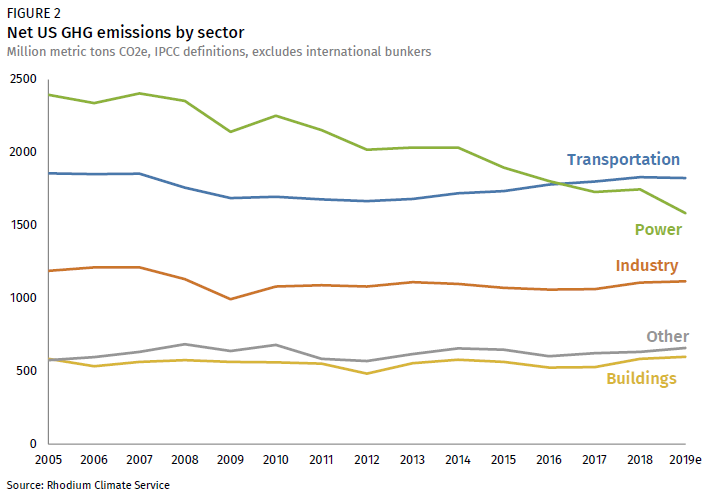Environment & Energy
Related: About this forumUS Emissions Dropped In 2019, But (Surprise!) Will Likely Miss Paris Targets
Rhodium Group) – After a sharp uptick in 2018, we estimate that US greenhouse gas (GHG) emissions fell by 2.1% last year based on preliminary energy and economic data. This decline was due almost entirely to a drop in coal consumption. Coal-fired power generation fell by a record 18% year-on-year to its lowest level since 1975. An increase in natural gas generation offset some of the climate gains from this coal decline, but overall power sector emissions still decreased by almost 10%. Unfortunately, far less progress was made in other sectors of the economy. Transportation emissions remained relatively flat. Emissions from buildings, industry and other parts of the economy rose, though less than in 2018. All told, net US GHG emissions ended 2019 slightly higher than at the end of 2016. At roughly 12% below 2005 levels, the US is at risk of missing its Copenhagen Accord target of a 17% reduction by the end of 2020, and is still a long way off from the 26-28% reduction by 2025 pledged under the Paris Agreement.
A Coal-Driven Decline
The switch from coal to natural gas and renewables in the electric power sector accounts for the majority of the progress the US has made in reducing emissions over the past decade. This was particularly true last year. Based on a combination of monthly data from the Energy Information Administration and daily data from Genscape, we estimate that coal-fired power generation fell by 18% in 2019 (Figure 1). That’s the largest year-on-year decline in recorded history with coal generation now at its lowest level since 1975. It also marks the end of a decade in which total US coal generation was cut in half.
Natural gas generation made up much of the gap last year, as it has consistently in recent years, thanks to extremely cheap gas prices. Average annual prices at Henry Hub were down 20% in 2019, adjusted for inflation, to their lowest level in decades. Renewables played an important role as well thanks in part to continued cost declines in both wind and solar generation. Based on preliminary data from EIA and Genscape, utility-scale renewable generation (including hydro) was up 6% in 2019. That’s higher than the 3% gain in 2018, but lower than the 13% gains posted in 2016 and 2017.
EDIT
Unfortunately, there was little good news outside the power sector, continuing a trend we have observed for the past several years. Based on preliminary data, we estimate that transportation emissions declined slightly—by 0.3% year-on-year (Figure 2). Industrial emissions (both energy and process) rose by 0.6%. Direct emissions from buildings increased by 2.2% and emissions from other sectors (agriculture, waste, land use, oil and gas methane, etc) rose by 4.4%.
EDIT

Net U.S. greenhouse gas emissions by sector, 2005-2019. Graphic: Rhodium Group
EDIT
https://desdemonadespair.net/2020/01/preliminary-u-s-carbon-emissions-estimates-for-2019-coming-up-short-on-climate-targets.html
Loki Liesmith
(4,602 posts)I should fit it with an ARMA model and see what the future holds.